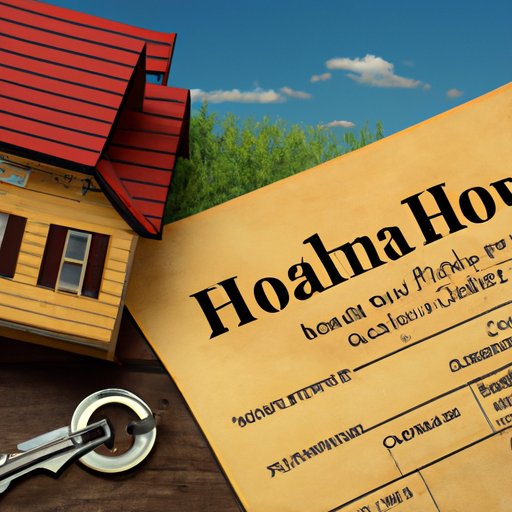Introduction
Bankruptcy is a legal process that relieves individuals and businesses of their financial obligations. It allows debtors to start fresh and rebuild their financial stability. When it comes to getting a loan after bankruptcy, there are several options available. One such option is an FHA loan, which is insured by the Federal Housing Administration (FHA). In this article, we’ll explore how long after bankruptcy you can get an FHA loan.

Exploring the Timeframe for FHA Loan Eligibility After Bankruptcy
Before applying for an FHA loan, it’s important to understand the waiting periods for different types of bankruptcies. Generally speaking, the waiting period for Chapter 7 bankruptcies is two years from the date of discharge. The waiting period for Chapter 13 bankruptcies is one year from the date of discharge. However, certain types of bankruptcy discharges may affect your eligibility for an FHA loan. For instance, if you received a discharge due to fraud or dishonesty, you may not be eligible for an FHA loan.

What to Know About Getting an FHA Loan After Bankruptcy
In order to be eligible for an FHA loan after bankruptcy, you must meet certain criteria. First, you must have a credit score of at least 580 in order to qualify for a 3.5% down payment. If your credit score is lower than 580, you may still be eligible for an FHA loan, but you will need to make a 10% down payment. Additionally, you must have a steady income and demonstrate your ability to make payments on time. You should also have no outstanding financial obligations, such as child support or alimony.
Steps to Take in Order to Get an FHA Loan After Bankruptcy
If you’re looking to get an FHA loan after bankruptcy, there are a few steps you should take. First, you should work on rebuilding your credit. Pay all bills on time and keep balances low on any existing credit cards. You should also obtain copies of your credit report to ensure there are no errors or discrepancies. In addition, you should obtain documentation that proves your bankruptcy was discharged. This includes court documents, financial statements, and other relevant paperwork.
Once you’ve gathered the necessary documentation, you’ll need to meet the lender’s requirements in order to get an FHA loan. This includes providing proof of income, employment history, and assets. You’ll also need to provide an explanation of how the bankruptcy occurred and why it won’t happen again. Finally, you’ll need to provide the lender with a signed repayment plan.

Understanding FHA Loan Requirements Following Bankruptcy
When applying for an FHA loan after bankruptcy, you’ll need to meet certain requirements. This includes having a loan-to-value ratio of 96.5%, meaning the amount borrowed cannot exceed 96.5% of the property’s appraised value. You must also have a debt-to-income ratio of 43%, which means your total monthly debt payments cannot exceed 43% of your gross monthly income. Additionally, you’ll be required to pay a mortgage insurance premium, which is typically 1.75% of the loan amount.
How Long It Takes to Qualify for an FHA Loan After Bankruptcy
The amount of time it takes to qualify for an FHA loan after bankruptcy depends on several factors. First, you’ll need to reestablish your credit history by making all payments on time and keeping balances low on any existing credit cards. Additionally, you’ll need to gather all the necessary documentation, such as court documents, financial statements, and other relevant paperwork. Finally, you’ll need to meet the lender’s requirements, including providing proof of income, employment history, and assets.
Once all the requirements have been met, the lender will review your application and determine whether or not you qualify for an FHA loan. The entire process typically takes between two and six months, depending on the complexity of your situation.
Conclusion
Getting an FHA loan after bankruptcy can be a daunting task, but it is possible. Understanding the waiting periods for different types of bankruptcies and meeting the lender’s requirements can help you qualify for an FHA loan. Reestablishing your credit history, obtaining the necessary documentation, and meeting the lender’s requirements are all key steps in the process. With patience and dedication, you can get an FHA loan after bankruptcy.
(Note: Is this article not meeting your expectations? Do you have knowledge or insights to share? Unlock new opportunities and expand your reach by joining our authors team. Click Registration to join us and share your expertise with our readers.)
